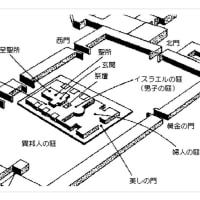ゼカリヤ書1章 幻による預言
1.ゼカリヤ書の背景
ゼカリヤは、イスラエル人がバビロン捕囚から帰ってきた頃に預言者として活躍した人です。実際に帰還者であり、指導者であったエズラは、エズラ記の中で「預言者ハガイとイドの子ゼカリヤの二人の預言者が、イスラエルの神の名によって預言した」と語っています(5:1)。ですから、先に読んだ預言書のハガイとも同時代の人で、実際に、1節「ダリヨスの第二年の第八の月」(1:1)は、BC520年、ユダヤ人がパレスチナに帰還し始めてから16年後のこと、ハガイが預言活動をしていた時期に重なります(ハガイ2:10)。
なおゼカリヤは、本来は、イドの孫にあたる人ですが、自分をイドの子としています(1:1)。おそらくそれは、父ベレキヤが祖父イドより先に死んで、祭司の職務を祖父のイドから直接受け継いだためなのでしょう。
さてゼカリヤのメッセージは、叱責調に悔い改めを勧めています。しかしそれは、すでにハガイ書でも見たように、神殿再建の熱意に冷めてしまったユダヤ人たちを、再びその使命に立たせようとするものでした。
2.ゼカリヤの幻
続く7節以降は、「ダリヨスの第二年の第十一の月」、つまり、その3ヶ月後ユダヤ歴のシェバテの月に語られたもので、ここからは種々の幻によって神のことばが伝えられています。第一の幻は、谷底にあるミルトスの木の間に立つ赤い馬に乗った人です。ミルトスは、黄色い花を咲かせ、青黒色の実をならせる芳香のある常緑の灌木で、高さは数メートルになります。イスラエルでは、「祝いの木」(55:13)として、めでたい時の装飾用に用いられます。その木の間に立っているのですから、彼は祝福をもたらす人なのでしょう。しかし赤い馬は、流血と戦争の象徴です。さらに彼の後ろには、栗毛や白い馬がいました。栗毛の馬は紛争と不安を、白い馬は平和と勝利を象徴します。そして神が解説して言います。「これらは、地を行き巡るために主が遣わされたもの」(10節)である、と。「地を行き巡る」は、ペルシア帝国の騎馬巡視隊のイメージを借用したものでしょう。流血や戦争、それに続く、紛争や社会不安など、一連の出来事があった後で、最後には平和の時代がやってくることを言っているのです。事実彼らは「全地は安らかで、穏やかでした」(11節)と主の使いに報告をしています。ただそれは、ユダヤ人にとっては良いメッセージではなかったのです。というのも、もはや昔日の栄光を取り戻すことができない、バビロンに滅ぼされ奴隷とされた歴史が固定化されていく悲しい現実を突きつける報告でもあったからです(12節)。
しかし、主は、祝福をもたらす方、未来を導かれる方で、ゼカリヤに良いことば、慰めの言葉を与えられています(13節)。つまり第二の幻が語られます(18節)。四つの角は、ユダとイスラエルを滅ぼした諸国家、つまり、アッシリア、エジプト、バビロン、メドペルシャを象徴しています(19節)。神はそれらを滅ぼされる、と。そしてさらに新しい世界秩序を打ち立てられる、と言うのです。
人間の歴史は、しばしば動かしがたく、もはや変えることのできない流れとなり、固められ、私たちの希望を奪い去っていくものです。この秩序は固定化され永遠に続いていく、少なくとも自分が生きている間は、と思わされることがあるものでしょう。しかし、主は思うままに、その流れの向きを変えられるのです。その神の御業に期待することを忘れてはなりません。では今日も良き一日となるように祈ります。
<クイズコーナー>
最初に、昨日のクイズです。イスラエルにとって政治暦で新年となる第七の月は、別名なんと呼ばれているでしょうか?①チスリの月、②アビブの月、③ニサンの月。答えは、①チスリの月でした。②アビブの月は、新年を春説とする第1の月のことを言います。またバビロニヤ暦ではニサンの月とも呼びます。では、今日の聖書クイズです。ゼカリヤ書は、新約聖書で、何回言及されていると言われているでしょうか?①約5回、②約30回、③約70回。答えはまた明日。では今日も良き一日となるように祈ります。
Zechariah 1: Prophecy through a Vision
1. background of the book of zechariah
Zechariah was a prophet at the time the Israelites returned from the Babylonian captivity. Ezra, the actual returnee and leader, says in the Book of Ezra that "two prophets, Haggai the prophet and Zechariah the son of Iddo, prophesied in the name of the God of Israel" (5:1). Thus, he was also a contemporary of Haggai in the earlier prophetic book, and indeed, verse 1, "the eighth month of the second year of Dariyos" (1:1), coincides with Haggai's prophetic activity in 520 BC, 16 years after the Jews began their return to Palestine (Haggai 2:10).
Zechariah, who was originally the grandson of Iddo, refers to himself as the son of Iddo (1:1). Perhaps this is because his father Berechiah died before his grandfather Iddo, and he inherited the priestly duties directly from his grandfather Iddo.
Now Zechariah's message is a reprimanding exhortation to repentance. But, as we have already seen in Haggai, it was an attempt to reenergize the Jews, who had cooled down from their enthusiasm for the rebuilding of the temple, and to get them back on their mission.
2. the vision of Zechariah
The following seven verses and the rest of the text are from the "eleventh month of the second year of Darius," or the month of Shevat, three months later in the Jewish calendar, in which the Word of God is conveyed through various visions. The first vision is of a man on a red horse standing among the myrtos trees in the valley floor. The myrtos is a fragrant evergreen shrub with yellow flowers and blue-black berries, several meters tall. In Israel, it is used as a "tree of celebration" (55:13) and for decoration on auspicious occasions. Since he is standing among those trees, he must be the one who brings blessings. The red horse, however, is a symbol of bloodshed and war. Furthermore, behind him were chestnut and white horses. The chestnut horse symbolizes conflict and unrest, while the white horse symbolizes peace and victory. Then God explains and says. These are the ones the Lord has sent to go throughout the land" (v. 10). The "going about the land" is probably borrowed from the image of the Persian Empire's mounted patrols. After a series of events, including bloodshed and war, followed by conflict and social unrest, they are referring to a final period of peace. In fact, they report to the angel of the Lord that "the whole earth was at peace and quiet" (v. 11). But that was not a good message for the Jews. It was not a good message for the Jews, because it was also a report of the sad reality that they could no longer regain the glory of the old days, and that their history of being destroyed and enslaved by Babylon was fixed (v. 12).
However, the Lord, the One who brings blessings and guides the future, gives Zechariah good words, words of comfort (v. 13). In other words, a second vision is spoken (v. 18). The four horns symbolize the nations that destroyed Judah and Israel: Assyria, Egypt, Babylon, and Medo-Persia (v. 19). God will destroy them, he said. He will also establish a new world order.
Human history is often an unsettling and unchangeable trend, solidified and robbed of our hope. It may seem at times that this order is fixed and eternal, at least in our own lifetime. But the Lord can change the direction of the flow as He pleases. We must not forget to look forward to God's work. I pray that today will be another good day.
<Quiz Corner
First, yesterday's quiz. What is the seventh month of the year, which is the New Year in the Israeli political calendar, also known as? (1) The month of Chisri, (2) The month of Aviv, and (3) The month of Nisan. The answer was (1) the month of Chisri. The month of Abib is the first month in which the New Year is considered to be the spring theory. It is also called the month of Nisan in the Babylonian calendar. Now, here is today's Bible quiz. How many times is the book of Zechariah said to be mentioned in the New Testament? (1) about 5 times, (2) about 30 times, and (3) about 70 times. The answer will be given tomorrow. Well, I pray that today will be another good day.
















